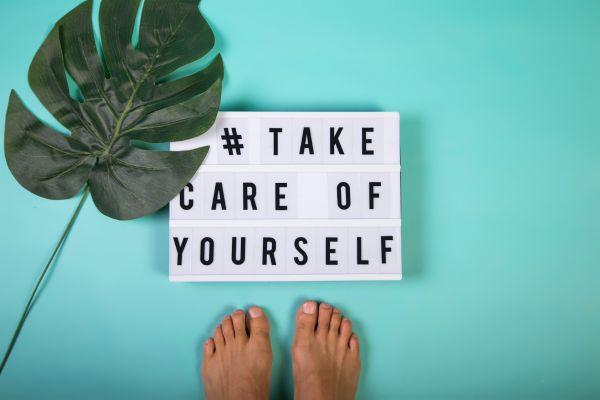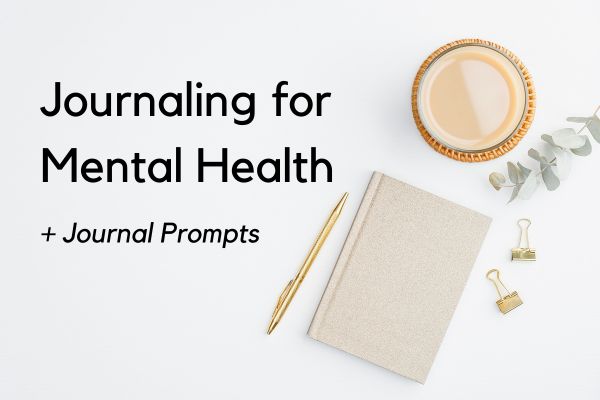For many years, journaling has held its place as a valuable tool for managing stress, easing symptoms of depression and anxiety, enhancing mental focus, and improving overall well-being. Journaling offers a deeper connection to the self and a journey towards personal growth.
Journaling can be very convenient to add to your daily life as it only requires paper and a pen. In this article, we’ll explore the benefits of journaling and provide a quick guide to help you get started!
“As there are a thousand thoughts lying within a man that he does not know till he takes up the pen to write.”
— William Makepeace Thackeray, The History of Henry Esmond
Top 5 benefits of journaling for mental health
Study shows daily journaling can improve mental health and wellbeing. Also, it’s a great way to organize thoughts, express yourself, and manage your emotions positively and healthily.

Here are some of the benefits of journaling for mental health:
1. Reduce Stress and Anxiety: Journaling is a powerful stress management tool. Expressing your thoughts and emotions on paper can help release tension and reduce stress levels. It’s like having a personal confidant who listens without judgment. (Related blog: How to calm anxiety naturally: 9 tips to help you)
2. Improve Mental Clarity: Journaling can clear mental clutter. When you write down your thoughts, it helps organize your mind, making it easier to focus and make important decisions. It’s like a mental detox.
3. Regulate Emotion: Regular journaling can promote self-awareness and emotional intelligence. It allows you to explore and understand your feelings, which can lead to better emotional regulation and greater overall well-being.
4. Achieve Your Goals: Writing down your goals and aspirations in a journal provides clarity and commitment. It helps you track your progress, celebrate successes, and stay motivated to accomplish your dreams.
5. Enhance Problem-Solving and Creativity: Journaling stimulates your problem-solving abilities and creativity. It encourages you to explore different perspectives and brainstorm solutions to your challenges.

How to start journaling for mental health
Journaling offers a range of styles to suit your preferences. You can choose from gratitude journaling, bullet journaling, reflective journaling, and more. In fact, experimenting or mixing up different types of journaling can make the practice more enjoyable, increasing your motivation to stick with it!
If you’re new to journaling, don’t worry; it’s an easy and accessible practice. Follow these simple steps to begin your journaling journey:
1. Keep it Simple: Remember, keep it as simple as possible to start. Choose whatever notebook you have by the side, or even start with plain paper.
2. Find a Quiet Space: Pick a quiet and comfortable place where you won’t be easily distracted. It can be on a table or your bed, anywhere that makes you feel peaceful and cozy.
3. Set Time Limit: Plan a time each day, preferably in the morning or before bedtime. Set a time limit of 10-20 minutes that can help you reduce the stress of doing it.
4. Express Freely: There are no rules in journaling. Write whatever comes to mind. It can be your thoughts, feelings, dreams, or even daily experiences. Whatever feels right to you.

5. Don’t Judge: Let go of any expectations! There’s no right or wrong way to journal. Don’t judge your writing; it’s a safe and personal space for you to write or draw.
6. Write a Gratitude Journal: I highly recommend writing a daily gratitude list. It sets a positive tone for your writing and can significantly impact your mindset.
7. Track Your Habit or Progress: It feels great to keep track of your daily habits and achievements. Tracking your habits or mental and physical health can keep you motivated and be more mindful about your daily choices.
By following these simple steps, you’ll be on your way to experiencing the benefits of journaling for your mental health. Remember, make journaling a habit. Consistency is the most important thing to help you achieve your goals.

Journal prompts to help you start journaling
Are you ready to start journaling? Or are you looking for prompts to help you dive deeper into your journey and self-reflection? Here are 10 journal prompts that can inspire you.
1. Morning Reflection: Write about your morning routine. How does it set the tone for your day, and what could you do to make it more enjoyable and productive?
2. Dream Investigation: Describe a dream or recurring dream you’ve had recently. What emotions or themes are associated with it? How might it relate to your waking life?
3. Bucket List: List five things you’ve always wanted to do or experience. Explore the reasons behind these desires and consider taking steps to fulfil one of them.

4. Role Models: Write about someone you look up to. What qualities or achievements do you admire in them? How can you apply these lessons to your own life?
5. Favorite Memory: Recollect a cherished memory. Describe it in detail and reflect on how it shaped your values and personality.
6. Obstacles and Growth: Think about a recent challenge you faced. How did you overcome it, and what did you learn from the experience?
7. Daily Affirmations: Write down three positive affirmations about yourself or your life. Repeat them and elaborate on how they make you feel.
8. Book or Movie Review: Share your thoughts on the last book you read or movie you watched. What themes or lessons stood out to you, and how might they relate to your life?
9. Travel Adventure: If you could travel anywhere in the world, where would you go and why? Describe the sights, sounds, and experiences you’d like to have on this journey.
10. Letter to Your Future Self: Write a letter to the “you” in the future. Discuss your hopes, dreams, and aspirations. Consider what advice you would give to your future self.

Conclusion: Start Journaling Today for a Better Tomorrow!
In journaling, we’ve explored the limitless potential for self-discovery, growth, and mental well-being. Whether you’re using it to express gratitude, essay challenges, or discover your dreams, journaling is a powerful tool. With each entry, you’re one step closer to the best version of yourself, one day at a time.
More Blogs to Improve Mental Health:




